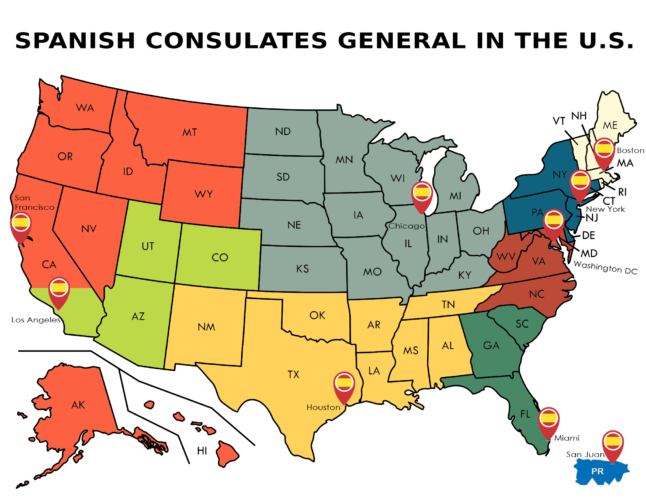What’s the latest?
On Friday September 3rd Spanish health authorities removed the United States from the list of third countries whose travellers do not have to meet Spain’s Covid travel restrictions.
This comes just days after the EU recommended Member States introduce tighter restrictions for travellers from the US and a handful of other third countries with worsening Covid figures.
What were Spain’s rules for American travellers previously?
Since late June 2021, people in the United States were able to visit Spain for non-essential reasons such as tourism without having to provide proof of Covid-19 vaccination or a negative Covid test.
The reason for this exemption from the general rules for non-EU/EEA travellers was that Spanish authorities placed the United States on its list of low-risk third countries, which included a select few countries such as New Zealand and Singapore with low Covid-19 infection rates.
Therefore, anyone in the US – vaccinated or unvaccinated, tested or not tested – could board flights from the United States to Spain without too much hassle, unless they presented symptoms compatible with Covid-19.
What are Spain’s new rules for American travellers?
From Monday September 6th 2021, the rules for US travellers heading to Spain changed, especially depending on whether they are vaccinated or not.
In a nutshell, people in the US travelling to Spain now have to show proof of their Covid-19 health status (vaccination, testing or recovery), whereas for most of the summer period they did not have to.
According to the Spanish Consulate in Washington, “this regulation does not exempt passengers on a layover at an EU country, prior to their arrival to a Spanish airport, from complying with the entry requisites of the said country”.
- Vaccinated US travellers
Crucially, vaccinated travellers from the US can visit Spain for non-essential reasons such as tourism, whereas unvaccinated Americans cannot under the new rules.
Spain accepts vaccines that have been “authorised by the European Medicines Agency or those that have completed the process of emergency use by the World Health Organisation”, which as things stand are Pfizer, Moderna, AstraZeneca and Johnson & Johnson, Sinopharm, Sinovac and Covishield.
They have to provide proof they completed their Covid-19 vaccination (both doses in most cases) at least 14 days before travel to Spain.
Spain accepts vaccination certificates “issued by the competent authorities” of the country where you’ve been vaccinated.
These should include:
- Name and surname of the vaccinated person.
- Date of vaccination, indicating the date of the last dose administered.
- Type of vaccine administered.
- Number of doses administered/complete vaccination treatment.
- Issuing country.
- Identification of the issuing body that provided the vaccination certificate.
The certificate has to be in either Spanish, English, French or German or if not it should be accompanied by an official translation into Spanish by an official body.
Vaccinated US travellers heading to Spain also have to complete a health control form on the Spain Travel Health website or app before travel, the same rule that applies to all travellers arriving in Spain.
Children under 12 years of age are not required to present any certificate or supporting documents except the health control form.
READ MORE:
- The most common problems with the Spain Travel Health app and some potential solutions
- Which Covid vaccines does Spain accept for international tourists to visit?
- Unvaccinated travellers
Unvaccinated US travellers who want to visit Spain for leisure, to visit friends or to scout for a property are not able to do so from Monday September 6th 2021 until further notice.
Spain’s travel restrictions for most third countries, which have recently been extended until the end of September, state that unvaccinated travellers from outside the bloc cannot visit for non-essential purposes.
Only unvaccinated travellers from the US to Spain who meet one of the following conditions will be allowed in:
- You are a resident in the EU or Schengen country.
- You have a visa for a long duration stay in an EU or Schengen country.
- You work in transport, such as airline staff or are in a maritime profession.
- You work in diplomatic, consular, international organisations, military or civil protection or are a member of a humanitarian organisation.
- You have a student visa for a country in the EU or Schengen zone.
- You are a highly qualified worker or athlete who can accredit their work cannot be postponed or carried out remotely.
- You are travelling for duly accredited imperative family reasons.
- You are allowed entry due to force majeure or on humanitarian grounds.
- You are an immediate family member of a national of an EU Member State travelling together or travelling to join the national of an EU Member State.
- You are unmarried partners with a Spanish national. You must have a confirmation of this relationship issued by the Embassy of Spain based on documentation of proof.
- You are a person travelling for business purposes who should justify the importance of the trip for the interests of Spain processed through the Commercial Office of the Embassy of Spain
Previous authorisation to travel may be required in the case of highly qualified workers, those with imperative family reasons or force majeure reasons, so check with the closest Spanish consulate near to you in the US to find out the conditions that apply to your specific situation.

If you meet any of these criteria, you will be able to visit Spain if you provide a negative Covid-19 PCR test or equivalent (NAAT) taken within 72 hours before travel.
It’s also possible to provide a certificate of having recovered from Covid-19, issued by the competent authority or medical service at least 11 days after the completion of the first positive NAAT test result. The validity of the certificate will end 180 days from the sampling.
Again, accompanying children under 12 years of age are not required to present any certificate or supporting documents.
All unvaccinated US travellers who are able to travel to Spain currently must also complete a health control form on the Spain Travel Health website or app.
READ ALSO: When will it be possible to travel to the US from Spain in 2021?



 Please whitelist us to continue reading.
Please whitelist us to continue reading.
Member comments